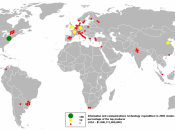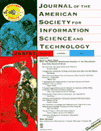Introduction
In a society, cumulatively shifting towards an information and technologically based society, the opportunities and implications that this move may have for the social and economic infrastructures, are of profound importance. This societal transformation from an industrial era to that of an "information age" is certain to impact and dominate those areas of society, influenced by the services provided by information and information technology. The potential that information technology has for example, to fundamentally transform and further enhance educational practices, is an issue of significant importance and one that must be discussed, when contemplating the value of living in an information society. Bigum and Green support this hypothesis, suggesting that as a consequence of structuring information technologies into the educational environment, schools will potentially face distinctly new challenges and academic objectives (Bigum & Green, 1992, p.4). Thus, the fundamental intention of this essay is to conduct a concise analysis of the reasons for why contemporary society has been labeled as the new "information age" and the underlying issues that may arise for society from the widespread utilisation of information technology.
This will consequently allow for a critical examination of the focus question, that of the implications and potentiality of information technology as a critical component of the educational infrastructure.
Contemporary society: the new "information age"?
To critically comprehend the universal phenomena of the "information age", it is essential to recognise the underlying influence and consequential impact of information technology on society. John Naisbitt, author of Megatrends argues that, "although we continue to think we live in an industrial society, we have in fact changed to an economy based on the creation and distribution of information" (cited in Wresch, 1996, p.6). This argument is supported by Barry Jones, who suggests that it is evident that the global economy is...


